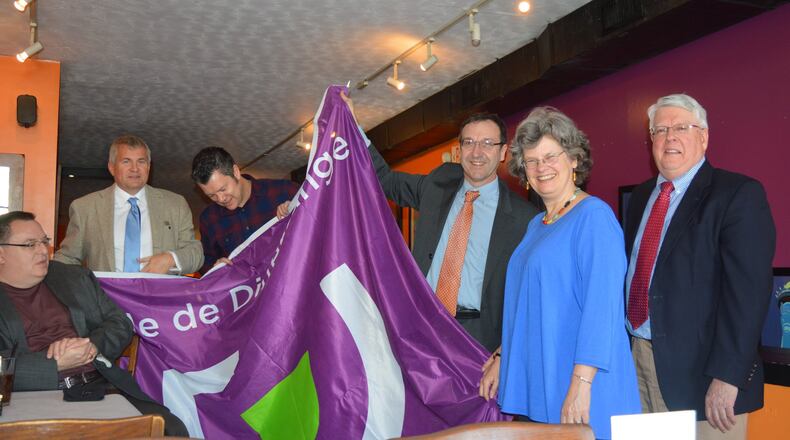The other two visitors were Henri Krecké, secretary of Differdange, the equivalent of a city manager here; and Thierry Leterre, the dean of the Miami University Dolibois European Center in Luxembourg.
The three arrived in Oxford on Feb. 19 and were taken on a tour of the city by the mayor and City Manager Doug Elliott, followed by a dinner hosted by Miami University.
The next day, they were taken on a walking tour of the Miami University campus led by Dr. Renate Crawford and then were guests of the city at a lunch at Kona Bistro prior to the signing of the Sister City agreement.
Ulveling, who serves as his city’s deputy mayor, said the city of Oxford had written to Differdange in 1999 suggesting a Sister Cities agreement because of the existing connection through Miami University. He said he learned of the request several months ago and decided to act.
“We never responded to the request suggesting an agreement. I took it to City Council and we responded to the request from 1999,” he said, adding his city has such agreements with cities in Italy, France, Germany and Portugal. “This is our first over the ocean. I think it can be a mutual benefit to both communities.”
The formal agreement was written in both English and French and before the signing, Rousmaniere read the English version with Ulveling reading the French. Then, both signed two copies of each.
Elliott introduced the ceremony saying the two cities were formalizing a relationship which they hoped to use for mutual benefit. The visitors had presented the city with a flag from Differdange at the lunch earlier and Elliott said it would soon be flying on the flagpole outside the library as a symbol of the relationship.
“This is a very important day for us. It is the start of a relationship between two cities. Miami University has a long-term relationship with Luxembourg. We are building on that,” Elliott said.
Leterre referred to the title of the book “Pattern of Circles” by John Dolibois in comments at Monday’s lunch. He said when he told people he was going to Miami they said he was going to Florida. Then he said it was Oxford and was asked about a relationship to the U.K.
“The circle came full circle,” he joked.
Leterre said his city will mark the 20th anniversary this year of the European Study Center relocating to Differdange in 1997 and next year, Miami will celebrate 50 years of operating the center, which opened in Luxembourg in 1968.
The MUDEC dean said the center and the city of Differdange have a strong relationship which is expected carry over to the Sister Cities relationship with Oxford. Students spending a semester there are involved in that community.
“Students do come in for service with the offices of the city after school. They work on the environment. We have funding for service learning. They provide marketing material,” Leterre said. “The city is very, very supportive.”
He said he is proud of an Award of Social Merit presented by the city in recognition of actions of the students.
Ulveling agreed, saying students are active in Differdange, including donating a tree and donating to a room in the city library named for John Dolibois.
“He was interested in people 50 years ago. I personally knew him. It’s good the celebration now is in a library,” he said, saying the agreement links two similar cities. “Both cities have the same number in the city. Both have nearly the same dimensions. It does not make sense to do a Sister City with a large city. We can talk about how to solve problems.”
He said plans are in the works for the city of Differdange to establish a grant for students at the study center to let them see the community values their work.
Elliott said in comments at Monday’s lunch a Sister City is when a community joins with a community in another nation to learn more about each other and to develop friendly and meaningful exchanges.
The program was launched at a White House conference in 1956 when President Dwight D. Eisenhower called for massive exchanges between Americans and the peoples of other lands, Elliott said of the program’s history outlined on its web site. Hundreds of American cities responded to that call, and are continuing to carry out meaningful exchanges with their partners in 136 nations around the world.
“A sister city program enables the citizens of both communities to become directly involved in international relations in unique and rewarding exchanges that benefit everyone,” Elliott quoted the Sister Cities web site, which went on to cite opportunities for citizens of different countries to work together.
He closed his comments by saying, “What we make of this Sister Cities partnership is limited only by our imagination and resources.”
About the Author
